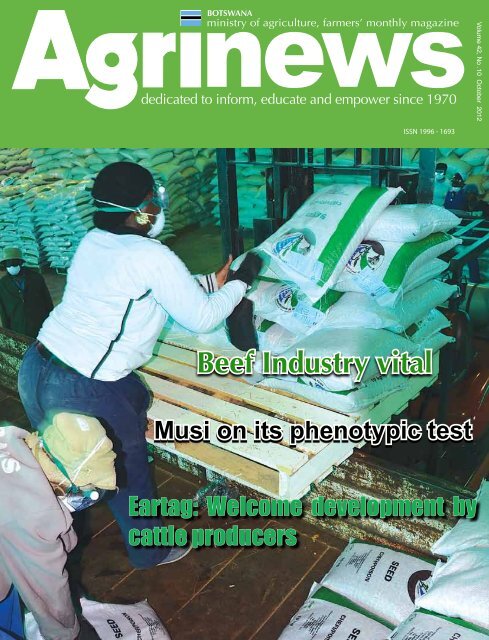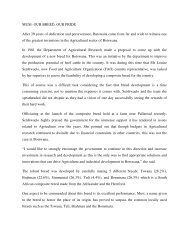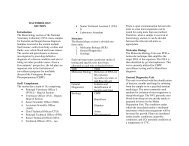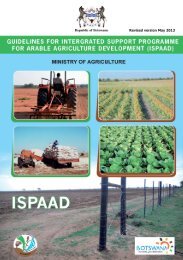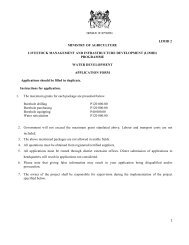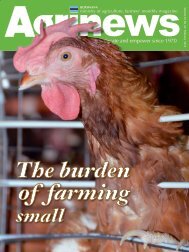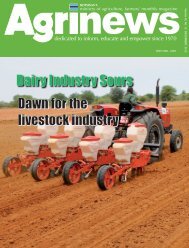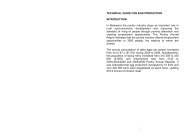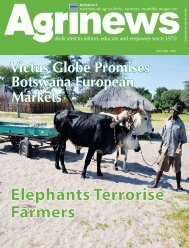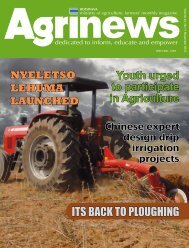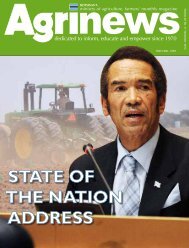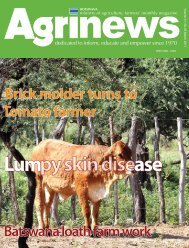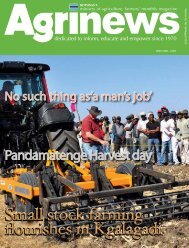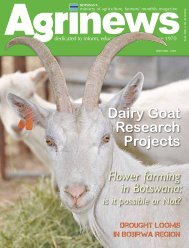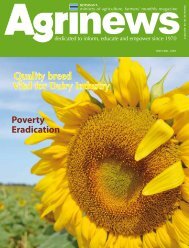Agrinews October 2012 - Ministry of Agriculture
Agrinews October 2012 - Ministry of Agriculture
Agrinews October 2012 - Ministry of Agriculture
- No tags were found...
You also want an ePaper? Increase the reach of your titles
YUMPU automatically turns print PDFs into web optimized ePapers that Google loves.
THE EARLYBIRD CATCHESTHE FATTESTWORM.Apply for your Arable Seasonal Loan today.Get a loan for your ploughing inputs, e.g. seeds, fuel, insecticides/pesticides and farm machinery. We <strong>of</strong>ferflexible repayments periods to suit your needs (half a year, quarterly and annually). Loans range from P10, 000 toP15 million.The loan is available from 1st July – 31st December <strong>2012</strong>. Hurry and take advantage <strong>of</strong> ISPAAD loan subsidy.*Terms and Conditions apply.ALL ENQUIRIES ON LOANS AND SERVICES… AND CUSTOMERFEEDBACK CALL OUR HELP DESK ON 360 4999NationalDevelopmentBank@NDBBotswanaGaborone >Tel: +267 3952801 | Fax: 3971044 • Francistown >Tel: +267 241 6044 | Fax: +267 241 6065 •Maun >Tel: 686 0316 | Fax: 686 0645 • Palapye >Tel: +267 492 0552 |Fax: +267 492 0551• www.ndb.bw
A G R I N E W S O C T O B E R<strong>2012</strong>ContentsEditorial1Beef Industry vitalMusi farms- greener pasturesVegetable production in MaunEartagging: welcome development by cattleproducersMusi on its phenotypic testNew Agricultural Support Services Project(ASSP)Arable sector continues to commercialize223425262728212The use <strong>of</strong> mulch in Horticulture210Drought hit horticulture farmersStud Breeder- Allan Botha21213 26Creme De La CremeLivestock Care during drought -Q&ACyber WoesFrom Rubbish collector to HorticultureWord Grid14 215216217185Teasers1912TeasersMoreri MoesiEditor:VacantReporters:France BegenselKeamogetse BoitshepoKesog<strong>of</strong>etse TaweleMokgarebe MotswakhumoEsther NkgwangKhutsafalo MaabongModiegi MadumetsaKeabetswe MolebatsiDesigner:Shadiki M MotingwaHead Of PhotographyHenry TotoPhotographers:Pius NkunndaPhineas Phineas<strong>October</strong> <strong>2012</strong>
VISIONFOUNDATIONPILLARSeditor’s noteALTERNATIVES ARE THEREAttain national food securityand global competitivenessin agricultural productsMISSIONTo improve agricultural productivitythrough technology developmentand transfer, diversification andcommercialization, inorder to promote food security inpartnership with our stakeholders.VALUES1. BOTHOWe treat our customers ina respectable and caring manner.2. TEAM WORKWe recognize the need to work asa team characterized by collectiveeffort, trust, understanding,support and perseveranceirrespective <strong>of</strong> rank or gender.3. CUSTOMER FOCUSEDOur customers are the focus<strong>of</strong> everything we do by beingcourteous, caring, compassionate,tolerant and empathetic.4. INNOVATIVEWe commit to employ new ideasand being proactive in order tomatch the requirements <strong>of</strong> thefuture.5. INTEGRITYWe foster a culture <strong>of</strong> transparency,accountability and dependability.Indeed times flies. It is yetanother ploughing season andeveryone is praying for goodrains so that they can plough andhave good harvest. The reality issuch rains are no longer coming.This therefore calls for carefulplanning to benefit from the littlesoil moisture content that can bereceived this rainy season.It will be a wise decisionfor farmers to think <strong>of</strong> hybridswhich are tolerant to dry spells,in particular, the maize cropwhich normally fails due to hightemperature.Farmers must always take stock<strong>of</strong> what happened to their cropsin the past seasons, such as lastyear, where a little precipitationwas received resulting in loweryields than anticipated.H y b r i d h a s d e s i r a b l echaracteristics <strong>of</strong> early maturityand drought tolerance with theability to increase crop yield.Therefore for famers to increasetheir harvest per hectare theymust dedicate themselves to theuse <strong>of</strong> hybrid seeds.Using hybrid seeds does notmean that some agronomicpractices such as weedingand cultivation should be ignored.Be it a hybrid or not holistic cropmanagement is a necessity.Those in the livestock sector shouldcontinue to provide their animals withsupplementary feeds, so that theycould survive the harsh conditions.Provide your animals with amongstothers coarse salt, drought pelletsand ensure that the animals arevaccinated for botulism.We know that our farmers havesurvived such hard conditions beforeand it is our humbly hope that Yesthey can. It is in such difficulties thateveryone <strong>of</strong> us becomes innovativeto do things better. Those, who areunable to sustain their livestock isbetter to sell them and save themoney until things improve.With the grace <strong>of</strong> God all odds canbe conquered.1<strong>October</strong> <strong>2012</strong>
Beef Industry vitalArticle: Joseph RamodisaPhotos: Phineas PhineasIt did not come as a surprise thatat this year’s Letsema II, the beefsector was the main issue. Thebeef sector has experienced setbacksdue to Foot and Mouth Disease(FMD) outbreaks and the loss <strong>of</strong> EUmarket last year, which resulted inthe Botswana Meat Commission’s(BMC) closure. Such situations hit thefarming communities.This has been a challenge forthe cattle industry, which callsf o r c o l l e c t ive c o - o p e r a t i o nbetween stakeholders for effectivemanagement. Letsema II forum wasmeant to achieve that.Minister <strong>of</strong> <strong>Agriculture</strong>, MrChristiaan de Graaff appealed t<strong>of</strong>armers to work closely with hisministry to ensure the pr<strong>of</strong>itability <strong>of</strong>the beef industry and its developmentto international standards.Another key issue is that <strong>of</strong> lower<strong>of</strong>f take rate, compared to that <strong>of</strong>the neighboring countries such asNamibia where they have double <strong>of</strong>ftake rate.With a high <strong>of</strong>f take rate, de Graaffsaid alternative market for the beefsector can be found. He noted thatthe local market is too little for thisindustry <strong>of</strong> about three million cattle.Securing those markets, hesaid, could be possible if all cattleproducers can act in accordance withrecommendation from those markets.To ensure compliance with marketrequirements, the Minister noted thatholdings where cattle are kept undersame management and not allowedto mix with others are in goodcondition as recommended.“All <strong>of</strong> us must take part for thissystem to be functional,” he said.“We must make sure all cattle inthe green zones are compliant to thisrecommendation.It has been observed by the<strong>Agriculture</strong> Hub Coordinator, Mr NilFitt that if the <strong>of</strong>f take rate in Botswanahas not increased in the next 20years, all beef will be consumedlocally. However, Fitt is positive thatit is possible to double or triple the<strong>of</strong>f take.Minister De GraaffFitt also states that processing <strong>of</strong>beef products locally will be morepr<strong>of</strong>itable rather than selling rawproducts.Many rural communities dependon the beef sector for their household income. Thus this industry issymbolic for the farming community,as a potential unifier and as animportant source <strong>of</strong> food and henceits protection is eminent.One <strong>of</strong> the farmers contributing at Letsema<strong>October</strong> <strong>2012</strong> 2
New Agricultural SupportServices Project (ASSP)Article & Photos: Felix MothategoTonota sub district councilorshave welcomed the newAgricultural Support ServiceProject (ASSP) with few suggestions.The briefing was done by theMonitoring and Evaluation specialist<strong>of</strong> ASSP, Mrs Daphney Keboneilwe atTonota Sub District Council recently.She said the project promotessustainable smallholder agricultureproduction.It is designed to improveproductivity <strong>of</strong> rainfed agriculture,focusing on ISPAAD to becomeeffective instrument <strong>of</strong> rural povertyreduction.This five year project is targetingabout 20 000 farming householdsexperiencing income insecurity,but with potential to benefit fromimproved agriculture services andtechnology.It also targets smallholderhouseholds hiring tractors for landpreparation, and planting as well asowners <strong>of</strong> draught animals.Keboneilwe said that tractor ownerswill be taught tractor maintenanceand how to benefit more from them,and that planting is going to be basedon agro ecological zones.She said that about US $6.06million has been set aside by IFAD,with the aim to increase productivityby bridging the gap between currentand potential rain-fed crop yields.There will also be demonstration <strong>of</strong>viable use <strong>of</strong> urban wastewater forirrigation.Another US $16.99 million is forimproved extension, <strong>Agriculture</strong>service centers, and institutionalstrengthening. An additional 1.97million is for project management.For his part, Councillor MkhondoMpho Legwaila- Veterinary Officer in Tonotasaid that he is a pioneer <strong>of</strong> farmmechanization in Botswana witha certain John Maplanka. He saidthey started it in 1979, as such; heis available for consultation services.Councillor Ntirang cautioned thatagro ecological farming should notbe restricted to weather patterns,but should include soil analysis invarious areas.Councilor Kgopa said when wetalk water recycling we fall shortto mention infrastructure such asroads to transport produce to market.He said Landboards are alwaysleft behind in discussions yet theycontinue to allocate farmers unfertileland for farming.Keboneilwe briefing Tonota Sub District Council<strong>October</strong> <strong>2012</strong>
Article:: Keseg<strong>of</strong>etse TawelePhotos: Aggripah WillieAny farmer anywhere in theworld who enters the studbreeding industry certainlydoes not want to be just anotherbreeder but have the prospect<strong>of</strong> being the crème de la crème.One can almost talk <strong>of</strong> precisionfarming in the stud farming business.Breeding cattle is not an easy job,whether a beef or dairy producer.Kereng Sparta Hlabano from NorthEast was one <strong>of</strong> those farmers whoaspired to be the best.His quest started in 2004. Butas the saying ‘great things are notdone by impulse but by a series <strong>of</strong>small things brought together’ hestarted by keeping dogs and laterbought a herd produced by a crossbetween Tswana and Brahman.In 2008, he bought 19 limousineweaners at P15 per kilogram inSouth Africa and that was whenthings really took <strong>of</strong>f for Hlabanoas a stud breeder.Increasing birth rate (%) and goodmanagement measure play a verycrucial role in increasing weaningpercentage and weight. Thus recordkeeping is very important whenfeedlotting or purchasing to avoidbuying animals <strong>of</strong> which theirhistory is not known as well asto avoid keeping animals that donot perform to expectations. Everyfarmer wants to run a pr<strong>of</strong>itablebusiness, so breeders select specificcharacteristics that are important tothem when selecting a breed to gowith in their farming business.Most commercial livestockfarmers market calves at weaningor slaughter age, therefore theincome generated will largely beinfluenced by the number, qualityor weight. Hlabano opted forlimousine because <strong>of</strong> its carcassHlabano with some <strong>of</strong> the prizes he wonCREME DELA CRÈMEoutput, calving ease, its hardinessand its ability to walk long distancesthat makes it somehow droughtresistant. In 2009, as the herdreadied for reproduction, he boughta limousine stud bull to servicehis herd. He now boasts <strong>of</strong> 70limousine stud breeds.As a full time commercial farmer,Hlabano stressed the importance<strong>of</strong> doing own research besides that<strong>of</strong> experts, as one wise man said ‘ifyou are not prepared to be wrong,you will never come up withanything original.’ He also keepsa herd <strong>of</strong> 30 Brahman breed forexperimental purposes. He crossedthis breed with limousine and got‘bramousine’ which he says revealedinteresting characteristics. He foundthat limousine has dominant geneson the calves, the calves alsomaintain high quality carcassand weight. Moreover they growbetter than Brahman. He revealsthat he used Brahman becauseit is common among farmers inBotswana due to its hardiness. Hisexperiments helped him keep topquality genetics in the breedingstock to ensure a good income.The awards he got from the recentNational Agricultural show attest tohis success in his breeding business.He walked away with a championbeef bull, champion beef cow,champion beef heifer and reservedgrand champion <strong>of</strong> the yard. Heattributed his winnings to goodmanagement and good preparationsand most importantly the Gracefrom God. He is currently in theprocess <strong>of</strong> registering with the SouthAfrican Limousine Association andaspires to form Limousine societyin Botswana. Hlabano sells toother aspiring communal andcommercial breeders. The cost <strong>of</strong>limousine and Brahman cows orheifers ranges from P10, 000 to P15,000 per beast.<strong>October</strong> <strong>2012</strong> 14
Livestock Careduring drought-Q&AThe year <strong>2012</strong>/13 is declareda partially drought year, thistherefore calls for farmers tochange their strategies for theirlivestock to survive the period.Due to poor rainfall during theprevious rainy season, grazing isnot adequate to sustain livestockuntil the next rainy season. To helpyou care for your livestock duringthis difficult times, KeamogetseBoitshepo chats to Mr ThatayaoneOageng, the Principal ScientificOfficer, Range Management.1. Elaborate on the <strong>Ministry</strong> <strong>of</strong><strong>Agriculture</strong>’s (MoA) drought reliefmeasure to provide Coarse Salt,Dicalcium Phosphate, Droughtpellets, Botulism vaccine, andVitamin ADEK at 25% subsidyand Mozambique ( North West) andSouth Africa (Bobirwa).4.What type <strong>of</strong> feeding methods(cattle feeding production systems)do you recommend and why?Ans: Semi-intensive productionsystem as animals will be given thefeeds/supplements when necessaryas they will be having access topasture.5.What breeding method or timewould be most suitable looking atthe drought conditions?PSO- Range Management- Thatayaone Oagengproduction projects? Which breedsshould they consider the most?Ans: They would need to havesourced information about theprojects before venturing into themand they should consider breedswhich are suitable to the localclimatic conditions like the Tswana,Brahman, Tuli etc and venture intosome other large frame breeds astheir skills broadens up.8.Are there any other droughtrelief measures that farmers canbenefit from?Ans: MoA has found it necessaryto subsidize 50 kg coarse salt, 50kg DCP, 50 kg drought pellets, 50doses <strong>of</strong> botulism vaccine and100 mls <strong>of</strong> vitamin ADEK at 25%effective from 1st August <strong>2012</strong>.2.Where can farmers access theabove?Ans: Livestock Advisory Centres3.Bobirwa and North West areasare said to be overstocked withLivestock. What strategies doesthe <strong>Ministry</strong> has in place to assistthe areas?Ans: To assist the areas in sellinglive animals to countries like AngolaAns: Most suitable breeding timeis January to March because by thenthe grazing conditions would bebetter and the animals would beable to drop calves around <strong>October</strong>to December when the rains wouldhave started falling.6.What other ways can farmersuse to take care <strong>of</strong> their livestockduring this period to avoid death<strong>of</strong> the livestock?Ans: Farmers will have tosupplement their livestock and theyshould see to it that they ventureinto fodder production.7.What advise would you give tothose that are starting up livestockAns: They can benefit fromLivestock Management andInfrastructure Development (LIMID)scheme to drill boreholes, equipand purchase boreholes as well asreticulate water for their livestock.They can also buy fodder seeds atsubsidized prices using ISPAAD.9. Any other information/advice that you would like to sharewith farmers?Ans: Farmers should see to it thatthey register their holdings andkeep record <strong>of</strong> their livestock forEU compliance.15<strong>October</strong> <strong>2012</strong>
Iopened my emails this morningand there it was again– screenupon screen <strong>of</strong> forwarded mail.Emails run from those that promiseprizes <strong>of</strong> the best-mechanizedtools….tractors and forklifts, tothose that promise winnings <strong>of</strong> lots<strong>of</strong> cash. My particular favorite…“Attention! Your Internet Bankingaccount has been violated”. Theyhumor me these. I even take timeto read them and see just how “theenemy” preys on our vulnerability.It is no laughing matter howeverfor those that have fallen victim tothese shenanigans and have actuallyparted with their life savings.Technology is fun. I used to keepup with all the new s<strong>of</strong>tware andgadgets in the market till I simplycould not anymore. And as longas there is good, the bad willcome lagging behind. This firstparagraph is dedicated to warningnot just youth but everybody againstcyber crime. Be very careful aboutdisclosing your bank details andyour general information. Find outfrom your bank first before you giveany details on line. Someone elsewill work...not very....hard to stripyou <strong>of</strong> your earnings.The rest <strong>of</strong> the column goes to theministry outlook emails. I have gonefrom enjoying the conversationsto simply being annoyed. Pleaseknow that I am a bit sorry to saythis, but it has been long over due.Arguments have sprawn over thisissue and again unfortunately, wehave had to be the ones deletengour bombarded inboxes. It has beenrequested over and over and overCyber Woesagain that messages go to only theapplicable people. Unfortunatelythis plea was reciprocated withmore debate and effort to convincethe rest <strong>of</strong> us why we shouldcontinue to endure.One such argument that caughtmy eye was from a commendablehorticultural <strong>of</strong>ficer in Mahalapyewho bravely and openly requestedthat he be sent information onhow to balance Ph is soillessmedia and any other informationon crop and animal productionprinciples and not transfers anddeath annoucements. It was a fairlystraight forward appeal I thought.The replys to that request came likeguns blazing.One such reaction stated thatthe poor <strong>of</strong>ficer could not afford tobe choosy. It went on that for thesake <strong>of</strong> the MoA family it is an allor none situation. In her/his words,either the poor <strong>of</strong>ficer receives andaccept a full dose <strong>of</strong> what is and willbe posted in this mail list despitepossibility <strong>of</strong> ‘allergic reactions’ to itor the <strong>of</strong>ficer signs out and to neverreceive anything at all.I must admit, this reply did catchme <strong>of</strong>f guard. It really is not toomuch to ask. If not all, most <strong>of</strong>the ministry department mailinglists are grouped so that relevantinformation goes to those relevantpeople. Personally, I can handle thedeaths and out <strong>of</strong> <strong>of</strong>fice messages.It is those personal ones about howmuch Jesus loves us, and somedebates that spawn no benefit tothe rest <strong>of</strong> us, that keep my teethclenched.It is a no issue in other <strong>of</strong>ficesreally and should minimally benone in our beautiful 7:30am- 4:30pm setting. In the end, Iwould like to leave you with one<strong>of</strong> the emails I truely gained from.It is the Sir Seretse Khama speech<strong>of</strong> Chancellor at University <strong>of</strong>Botswana, Lesotho and Swazilandgraduation ceremony (15 May1970; Botswana Daily News, 19May 1970, supplement)It simply goes: We were taught,sometimes in a very positive way,to despise ourselves and our ways<strong>of</strong> life. We were made to believethat we had no past to speak <strong>of</strong>, nohistory to boast <strong>of</strong>. The past, so faras we were concerned, was justa blank and nothing more. Onlythe present mattered and we hadvery little control over it. It seemedwe were in for a definite period<strong>of</strong> foreign tutelage, without anyhope <strong>of</strong> our ever again becomingour own masters. The end result <strong>of</strong>all this was that our self-pride andour self-confidence were badlyundermined.It should now be our intentionto try to retrieve what we can <strong>of</strong>our past. We should write our ownhistory books to prove that we didhave a past, and that it was a pastthat was just as worth writing andlearning about as any other. Wemust do this for the simple reasonthat a nation without a past is a lostnation, and a people without a pastare a people without a soul.By Gorata Boikanyo<strong>October</strong> <strong>2012</strong>
From Rubbish collector to horticultureArticle & Photos: France BegenselIt is not easy to find men, whowill allocate a certain amount<strong>of</strong> time to care for vegetables.Again especially in rural areaswould men be interested in smallscale enterprises more so thatthey are not well paying. But forModimoohile Muyoba, 40, <strong>of</strong>Kachikau, life has never been easywith the little he got from his lowpaying job as rubbish collector inthe village.Muyoba says that he saw it fitto supplement his wages withmoney generated from the sale<strong>of</strong> vegetables. He asserts that theunavailability <strong>of</strong> relish coupled withinsufficient food compelled him toventure into vegetable production.He adds that he also approved<strong>of</strong> the government initiaves thatinclude backyard gardening toescape the doldrums <strong>of</strong> poverty.The standard 7 holder says “Istarted growing vegetables in Aprilthis year. And since then I havenever looked back because I see alot <strong>of</strong> potential. And also the peopleare very encouraging because theyalways buy my vegetables.”Muyoba says that he took uphorticulture because he has love forvegetables. He says that vegetablesare very important in every mealbecause they boost the immunesystem. He says vegetables are alsocheap compared to meat. He addsthat people who tend to eat beefall the time are prone to diseaseslike Gout.He reveals that he has attendedhorticulture workshops in Kasane.He says that these have helpedhim a lot as he uses the knowledgegained to grow vegetables.Muyoba says that like any otherbusiness, vegetable productiondoes not come easy as there area number <strong>of</strong> challenges involved.He àdds that pests are a menace.He says he had devised ways <strong>of</strong>controlling them. He says that healways engages his agricultural<strong>of</strong>ficer whenever he has problems.He states that his crops are mostlyattacked by Aphids, adding thathe counters this by using ash fromfirewood remains. He discloses thatsometimes, he uses Blue Deathto control pests. He adds that heknows very well that if he uses suchhe will have to wait for a certaintime before he could harvest.The Kachikau born farmer sayshe grows Rape, tomatoes,Spinach,Florida Broadleaf and beans.Muyoba encourages Batswanain general to grow vegetablesto sustain themselves and evencreate employment for others. Heaspires to one day own a big farmgrowing vegetables and fruit trees.He adds that he would like toengage agricultural demonstratorsand financial institutions to growhis business.Muyoba supplement his wages by selling vegetables17<strong>October</strong> <strong>2012</strong>
WORD GRIDGRIDCompiled by Keseg<strong>of</strong>etse TaweleCompiled by Keseg<strong>of</strong>etse TaweleAseasonBecomeweakRootcropArtificialinseminationA….<strong>of</strong>lionsFemalesheep…….wormsA village inBotswanaCompostbreedLocalPlantigSeasonInternational organization <strong>of</strong>animal healthAgric radio programmeIntegrated support programmefor arable developmentHelloType <strong>of</strong> soilTurningsoilA fish’sorganCattle breedA breed <strong>of</strong> sheepMan-made watercatchmentsNot <strong>of</strong>fMale sheepTopmarkSound made by a cowBotswana agriculturalmarketing boardAlikeInside <strong>of</strong> a hand Morning PS in the <strong>Ministry</strong> <strong>of</strong><strong>Agriculture</strong> Dr Micus…..Growing <strong>of</strong> crops,………farmingBabygoatCattle breed Ordinary River<strong>October</strong> <strong>2012</strong> 18
Botswana is known for its beef cattle and for quite sometime she has remained one <strong>of</strong> the major exports to the lucrative Europeanmarket. Many countries desire her beef industry. It is this industry that as a nation we should protect and nurture.It is because <strong>of</strong> the need to continue growing the beef sector that the <strong>Ministry</strong> <strong>of</strong> <strong>Agriculture</strong> through the Department <strong>of</strong> AgriculturalResearch, unveiled a new composite beef breed.The new breed has been named Musi. It was named after a ranch where it was developed.Development <strong>of</strong> this breed was started in 1982. It is only now that we are seeing tangible results <strong>of</strong> such work. For correct results,research calls for patience and perseverence. This is the only way to bring positive results.Musi, with the motto “Our breed, our Pride” is one <strong>of</strong> the outcomes <strong>of</strong> such patience. Batswana waited patiently for the research to besuccessfully completed.The composition <strong>of</strong> this new breed is Tswana 28.2 %, Tuli 4.4 %, Brahman 22.6%, Simmental 26.3 % and Bonsmara 18.4 %. The good newsis that the breed can be managed under the free grazing system.<strong>Agrinews</strong> would like to recommend this bull to farmers, considering its reproductive performance, as it produces calves at yearly intervalwith an annual calving rate <strong>of</strong> 70 %.The animal’s average weight at birth is 34.5 kg.The animal is also an efficient converter at feed lot (gains 2.1 kg/day) and cold dressed mass is higher than for Tswana, Tuli and Brahmanbut comparable to Bonsmara and it fetches super scale at 21 months <strong>of</strong> age.The reason, we recommend farmers to adopt the breed is because the composite breed is an economical beef producer with high preweaning and post weaning growth rates. It is well adapted to the sub-tropical environment prevailing in Botswana.As our own locally bred animal we should strive to take advantage <strong>of</strong> it to grow the national herd. If we do not take advantage <strong>of</strong> this newdevelopment and improve our cattle breed who else will? Other nations should envy this new product in the market.Who knows this might be a candidate for export. Musi might be another opportunity for us as a country to increase our beef export base.This is a product which we as a nation have to be proud to have produced. It is worth promoting and celebrating.


